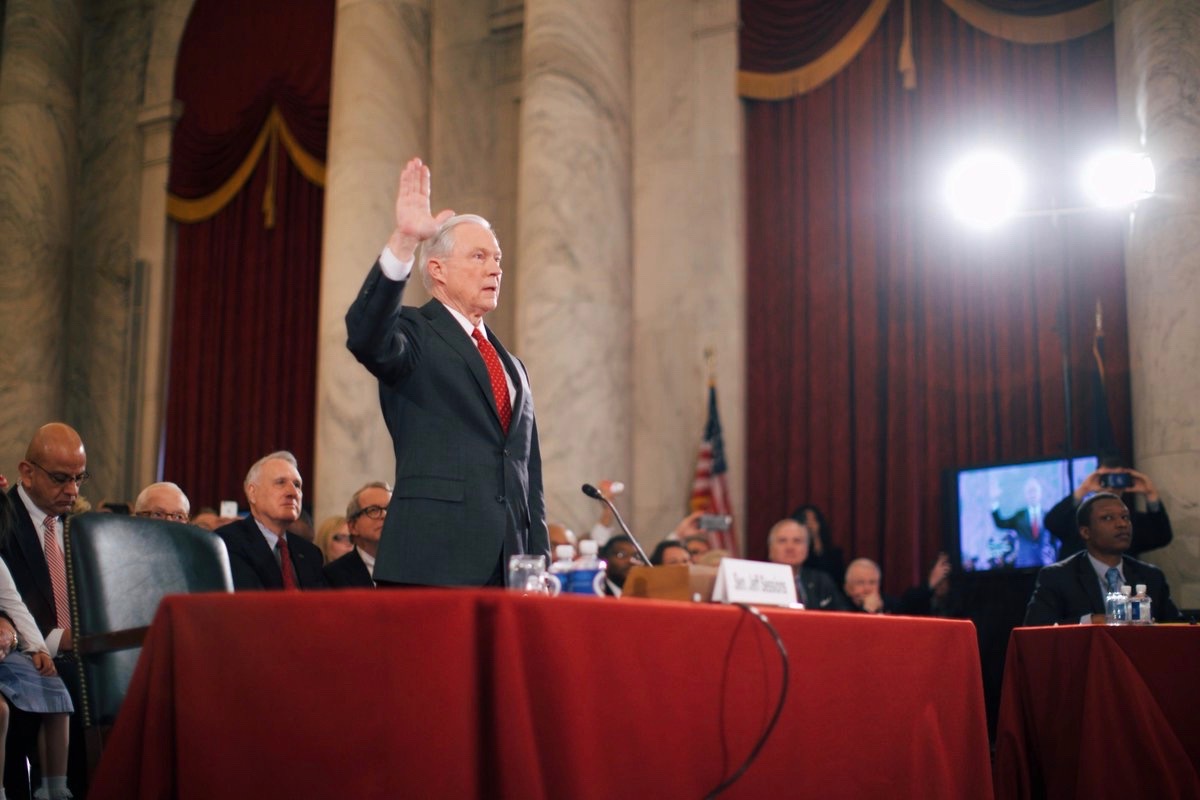Emotions were high during Attorney General Jeff Sessions’ testimony before his former Senate colleagues. He answered questions on his alleged contacts with Russians during the 2016 campaign, his role in the firing of FBI director James Comey, and whether he had fully recused himself from the FBI’s Russia investigation.
One area where Sessions was silent was on his personal conversations with President Trump.
While Democrats seized on Sessions refusal to discuss any conversations he had with President Trump, accusing the attorney general of “stonewalling,” Republicans left the hearing largely satisfied with the scope of Sessions’ testimony.
Sessions opened the hearing stating that his talks with the president were essentially off-limits. Citing “long-standing Department of Justice practice,” Sessions said he would not “violate my duty to protect confidential communications with the president.”
As senators peppered the attorney general with questions about the president’s reasons for firing the FBI director and whether he had knowledge of any discussions about pardoning individuals connected to the Russia investigation, Sessions declined to respond.
“Stonewalling of any kind is unacceptable,” Sen. Ron Wyden (D-Ore.) charged. “Americans don’t want to hear that answers for relevant questions are privileged or off limits.”
Sen. Martin Heinrich (D-N.M.) took the accusation a step forward, stating that Sessions refusal to disclose information about his talks with the president was “impeding” the Intelligence Committee’s investigation. “You are obstructing that congressional investigation by not answering these questions,” the senator said, adding, “I think your silence … speaks volumes.”
According to Sessions’ own testimony, Trump did not invoke executive privilege, a measure protecting private conversations cabinet officials or others may have with the president. By not invoking executive privilege, Trump essentially relied on Sessions’ discretion to answer senators questions as he saw fit.
Struggling to understand the legal basis for Sessions refusal to answer questions, Sen. Angus King (I-Maine) probed Sessions further. “The president hasn’t asserted [executive privilege]. You said you don’t have the power to assert … executive privilege,” King said.
Session responded that he was preemptively “protecting the right of the president to exert it if he chooses.”
A number of Republicans were surprised by the Democrats’ accusations in spite of what they saw as forthcoming testimony by the attorney general.
Sen. James Lankford (R-Okla.) said he was “amazed” at his colleagues response. “There’s a long history of attorney generals standing beside the president saying there are some conversations that are confidential,” he noted, citing former Attorney general Eric Holder who withheld testimony and documents from Congress during the Obama administration.
Even though Sessions responded “I do not recall” to more than a dozen questions, he was often surprisingly direct in defending his controversial decisions to recuse himself more than a month after assuming office or pen the memo originally used to justify the firing of James Comey.
“I don’t know what questions [Sessions] didn’t answer other than a detailed outline of every conversation he had with the president,” Sen. Marco Rubio (R-Fla.) told reporters after the hearing.
Sen. John Cornyn (R-Texas) said that Sessions was “appropriate” in refusing to disclose conversations he had with Trump. “The president needs to have an ability to communicate with his senior adviser in confidence and it can’t be just breached by casual conversations on a variety of topics.”
Sen. Susan Collins acknowledged that while Sessions answered many questions, she would have preferred him to “answer a few more.” Given the circumstances, however, she said she understood his reluctance.
Because Sessions declined to answer a number of key questions, it is still unclear whether the decision to fire the FBI director was the result of the Russia investigation, as both Trump and Comey suggested.
Sessions maintained that his reasons for recommending Comey’s dismissal were based on the FBI director’s defense of the way he handled the Clinton email scandal. Sessions described the entire affair as “a usurpation of the authority of the federal prosecutors in the Department of Justice.” Removing Comey, he said, was a way to “restore the classic discipline in the department.”






